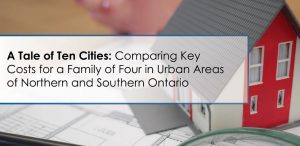 Is urban living more affordable in Northern Ontario than the south? Higher costs of food, electricity, and gasoline are routinely pointed to as factors that make Ontario’s northern regions less affordable, but evidence shows that the North is, in fact, less expensive!
Is urban living more affordable in Northern Ontario than the south? Higher costs of food, electricity, and gasoline are routinely pointed to as factors that make Ontario’s northern regions less affordable, but evidence shows that the North is, in fact, less expensive!
A Tale of Ten Cities: Comparing Key Costs for a Family of Four in Urban Areas of Northern and Southern Ontario examines the costs of some key goods and services for a family of four in 10 Ontario cities – five in the south and the ‘Big Five’ in the north – in order to provide a preliminary comparison of costs. The ‘Big Five’ northern communities include Thunder Bay, Greater Sudbury, Timmins, North Bay, and Sault Ste. Marie and the chosen Southern communities are Toronto, London, Niagara Falls, Ottawa, and Barrie.
The goods and services calculated for this commentary include shelter, utilities, cell phone, internet, gasoline, vehicle insurance, transit, food, recreation, and children’s activities.
The author, Anthony Noga, a former policy analyst at Northern Policy Institute (NPI) and current labour market analyst at the North Superior Workforce Planning Board (NSWPB) notes that “the most surprising finding was that incomes in the Big Five tended to be on par, and sometimes higher, than the Southern Ontario comparators.” He adds that this means residents living in the northern communities tend to spend a much smaller percentage of their income on goods and services and have more money left over to put towards other expenses.
Other interesting comparisons:
* The median value of dwellings in 2016 in Toronto was $601,922 compared to $259,097 in Sudbury.
* All of the Big Five, except for North Bay, have higher gasoline prices than the selected Southern Ontario cities. Timmins was the highest at $1.214 (per one litre).
* Northerners can expect to spend an extra $70 or more annually than they would in Southern Ontario when it comes to food costs at home. On the other hand, dining out is generally more affordable in the North compared to the examined southern cities.
* Post-Secondary tuition is cheaper across Northern Ontario
* Sports and recreation fees are in most cases lower for kids – hockey, swimming, soccer, ballet, even movie night is usually cheaper
Costs, such as food, communications services, and gasoline, are higher in the Big Five, but the data shows that these are more than offset by much lower shelter costs. Noga concludes, “all told, the median family of four can expect to save a considerable sum of money by living in a northern city.”
To read, A Tale of Ten Cities: Comparing Key Costs for a Family of Four in Urban Areas of Northern and Southern Ontario click here: https://www.northernpolicy.ca/a-tale-of-ten-cities
- L’école Sacré-Cœur (Chapleau) célèbre les Jeux olympiques - February 16, 2026
- L’école Sacré-Cœur (Chapleau) celebrates the Olympic Games - February 16, 2026
- Mixed Curling Standings – February 12 - February 16, 2026
 Wawa-news.com Local and Regional News
Wawa-news.com Local and Regional News

